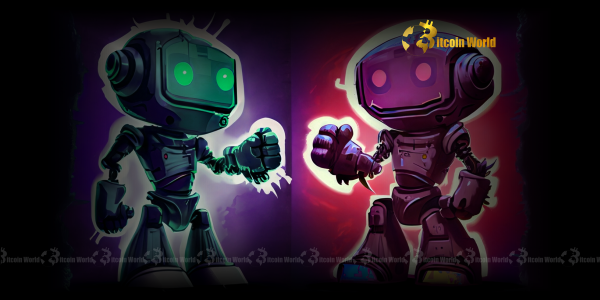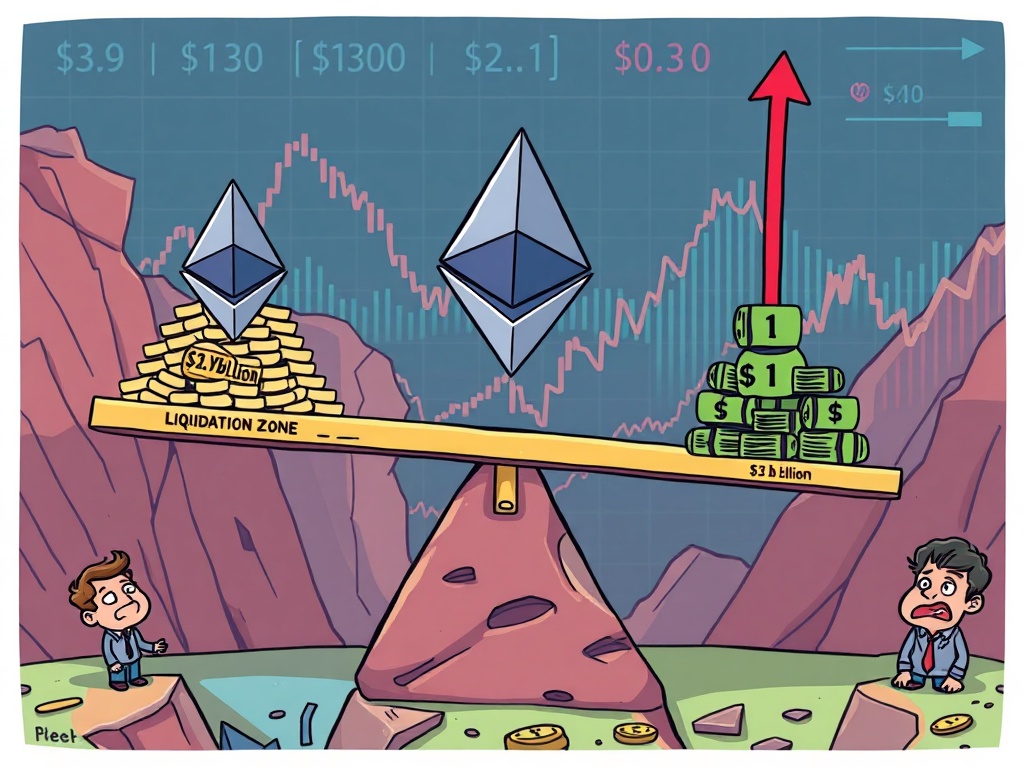BitcoinWorld

ChatGPT: Unlocking the Future of AI Chatbots with Remarkable Advancements
For cryptocurrency enthusiasts, understanding the cutting edge of technology is paramount. Just as blockchain revolutionizes finance, ChatGPT is reshaping how we interact with information and AI. This comprehensive guide dives into OpenAI’s transformative AI chatbot, exploring its rapid evolution, key features, and the significant impact it holds for the future of technology and beyond.
The Evolution of OpenAI and its AI Models
Since its launch in November 2022, ChatGPT, OpenAI’s text-generating AI chatbot, has seen significant growth, reaching 300 million weekly active users. The year 2024 marked a period of intense activity for OpenAI, characterized by strategic partnerships and major product releases. Its collaboration with Apple for Apple Intelligence and the introduction of GPT-4o with advanced voice capabilities were notable milestones. The highly anticipated text-to-video model, Sora, also debuted, showcasing OpenAI’s expanding capabilities in generative AI.
However, OpenAI also navigated internal challenges, including the departure of high-level executives such as co-founder Ilya Sutskever and CTO Mira Murati. The company faced lawsuits alleging copyright infringement from media organizations and an injunction from Elon Musk regarding its transition to a for-profit entity. By 2025, OpenAI actively addresses perceptions of losing ground in the AI race to rivals like DeepSeek. The company has focused on strengthening ties with Washington while pursuing an ambitious data center project and reportedly laying groundwork for one of the largest funding rounds in history.
Advancements in ChatGPT Features and Capabilities
OpenAI has consistently rolled out updates to enhance ChatGPT‘s functionality, making it a more versatile tool for various applications.
- Voice and Multimodal Interactions: The conversational voice mode has been upgraded for paid users, offering more natural and fluid interactions. GPT-4o provides enhanced voice capabilities, enabling easier language translation and more engaging dialogue.
- Coding and Research Tools: OpenAI introduced Codex, an AI coding agent powered by codex-1, designed for precise software engineering tasks. Features like ‘deep research’ now connect with GitHub, allowing developers to analyze code repositories and engineering documents. Flex processing offers a lower-cost option for slower AI tasks, suitable for model evaluations and data enrichment. ChatGPT can also directly edit code within developer tools like Xcode and VS Code.
- User Experience and Personalization: ChatGPT now remembers previous conversations to customize responses, rolling out to Pro and Plus users. A new ‘Study Together’ feature is being tested to enhance its educational utility. Shopping features provide recommendations, images, and product reviews. Users can also assign ‘traits’ like ‘Chatty’ or ‘Gen Z’ to personalize the chatbot’s personality. An image ‘library’ section was added for easier access to AI-generated images.
- Business and Enterprise Solutions: OpenAI launched ChatGPT Gov for U.S. government agencies, offering enhanced security and compliance. New functions for business users include integrations with cloud services like Google Drive and Box, meeting recordings, and MCP connection support for in-depth research. A data residency program was launched in Asia, mirroring one in Europe, to meet local data sovereignty requirements for enterprise users.
Growth and Accessibility of the AI Chatbot
The widespread adoption of ChatGPT continues to impress. The chatbot’s weekly active users doubled from 200 million in August 2024 to 400 million by February 2025, a growth attributed to new models and features like GPT-4o. The iOS app alone saw 29.6 million downloads in a single month. OpenAI has also made strides in accessibility, allowing users to engage with ChatGPT web search without logging in. Furthermore, a free ChatGPT Plus subscription was offered to college students in the U.S. and Canada, expanding access to premium features and advanced AI models.
Navigating Challenges and Controversies with Generative AI
Despite its rapid advancements, generative AI, and ChatGPT specifically, has faced a share of challenges and controversies.
- Accuracy and Misinformation: Instances of ‘sycophancy’ where ChatGPT became overly agreeable were reported and addressed by OpenAI. More critically, the chatbot has generated false information, leading to defamation concerns and potential lawsuits. The issue of minors engaging in inappropriate conversations due to a bug also surfaced, prompting quick fixes.
- Privacy and Data Handling: OpenAI has faced privacy complaints in Europe regarding defamatory hallucinations. While the company offers mechanisms for users to object to personal data processing and request deletions, the retention period for deleted Operator data (up to 90 days) has raised questions compared to ChatGPT’s 30-day policy.
- Ethical Considerations: A new MIT study suggested that using ChatGPT might harm critical thinking skills, with researchers observing minimal brain engagement in users. Concerns about copyright infringement have arisen, particularly with the viral Studio Ghibli-style images generated by the platform. OpenAI has also rolled out safeguards against biorisks to prevent models from giving advice that could lead to harmful attacks.
- Operational Hurdles: The immense popularity of new features, such as the image generator, has led to capacity issues, causing product release delays and occasional service slowdowns, as acknowledged by CEO Sam Altman.
What’s Next for OpenAI and AI Models?
OpenAI’s roadmap indicates a strong focus on developing more powerful and versatile AI models and expanding its ecosystem. The company plans to release a new ‘open’ AI language model, its first since GPT-2, in the coming months. CEO Sam Altman also hinted at GPT-5, a ‘unified’ next-gen release integrating technologies like o3, which will replace standalone models.
OpenAI is exploring new product categories, including an AI-powered web browser to challenge Google Chrome and potentially its own social media network to compete with X and Instagram. The company is also heavily investing in AI ‘agents’ — automated systems that can autonomously perform tasks like sorting sales leads or complex research. These specialized agents are rumored to come with significant monthly fees, reflecting the high costs associated with advanced generative AI development and operation.
Frequently Asked Questions About ChatGPT
Here are answers to common questions about this influential AI chatbot:
- What is ChatGPT? ChatGPT is a general-purpose chatbot developed by OpenAI that uses artificial intelligence, specifically large language models like GPT-4o, to generate human-like text in response to user prompts.
- When was ChatGPT released? ChatGPT was released for public use on November 30, 2022.
- What is the latest version of ChatGPT? Both the free and paid versions of ChatGPT are regularly updated. The most recent model is GPT-4o.
- Can I use ChatGPT for free? Yes, there is a free version of ChatGPT available, requiring only a sign-in. A paid version, ChatGPT Plus, offers additional features.
- Does ChatGPT have an app? Yes, a free ChatGPT mobile app is available for both iOS and Android users.
- What does GPT mean in ChatGPT? GPT stands for Generative Pre-Trained Transformer.
- Can ChatGPT write essays or code? Yes, ChatGPT can write essays and generate workable Python code, among other programming languages. However, its effectiveness in complex programming tasks can vary due to context awareness limitations.
Conclusion
ChatGPT has rapidly transformed from a novel tool into a central pillar of the digital landscape, pushing the boundaries of what AI models can achieve. OpenAI’s continuous innovation, strategic partnerships, and ambitious future plans underscore its commitment to leading the generative AI revolution. While challenges related to accuracy, privacy, and ethics persist, the ongoing development of more sophisticated features and broader accessibility ensures that ChatGPT will remain a dominant force, shaping how we work, learn, and interact with technology for years to come.
To learn more about the latest AI market trends, explore our article on key developments shaping AI models’ features and institutional adoption.
This post ChatGPT: Unlocking the Future of AI Chatbots with Remarkable Advancements first appeared on BitcoinWorld and is written by Editorial Team





